The Complex Role of Magic in Game of Thrones
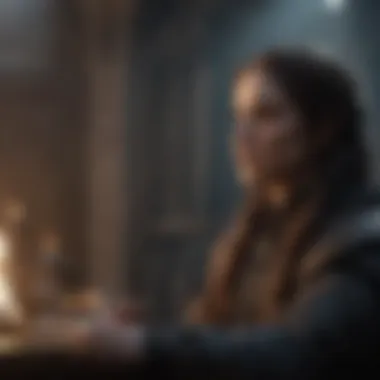
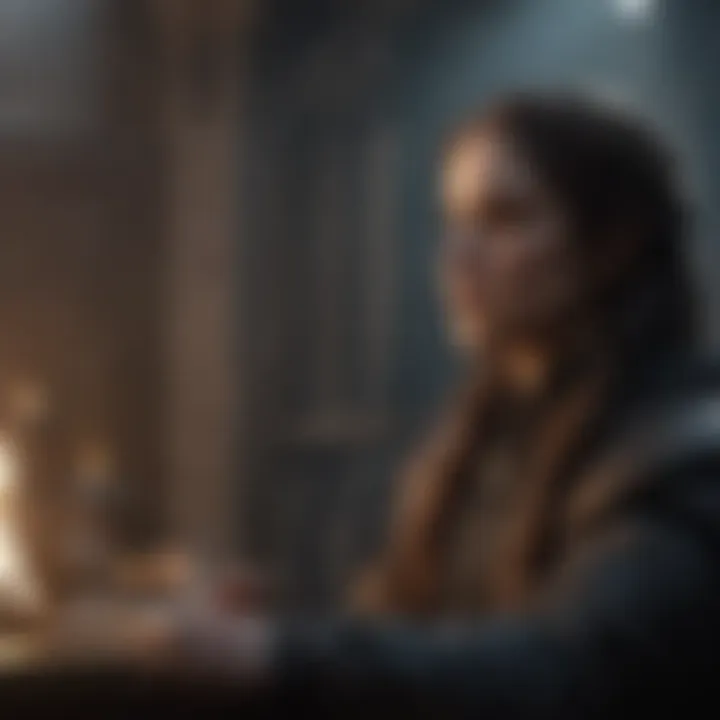
Intro
Magic in the realm of Game of Thrones isn’t just a flashy spectacle or mere smoke and mirrors. It serves as a thread woven delicately into the very fabric of the show's narrative, influencing characters, plotlines, and even the underlying themes of the saga. From the shadows of the Wall to the flames of Dragonstone, magic holds a significance that extends beyond its mystical allure—shaping the destinies of those who wield it and those who oppose it.
Throughout the series, we see various forms of magic, each with its own cultural implications and symbolic meanings. This exploration delves into the intricacies of these magical elements, providing an understanding of their relevance within the broader context of the Game of Thrones narrative. As we peel back the layers, we shall see how magic influences character journeys, drives the plot forward, and reveals the complexities of a world constantly on the brink of chaos.
In examining these magical threads, we will not only highlight key characters and pivotal events but also address underlying themes and the evolution of magic from the books to the screen. By digging into meticulous details and connecting the dots, we aim to present a richer understanding to both casual fans and seasoned followers of George R.R. Martin’s universe. So, let’s embark on this magical journey through Westeros, exploring the elegant chaos that magic brings to the grand tapestry of Game of Thrones.
Character Dissections
Detailed Analysis of Key Characters
As we step into the lives of important figures in Game of Thrones, one can’t ignore how magic molds their identities and actions. Daenerys Targaryen, with her dragons, embodies the raw power of magic and its intertwined fate with her lineage. Her journey from an exiled princess to the Mother of Dragons shows how magic can elevate a character's position, yet also burden them with expectations.
In sharp contrast, Melisandre, the Red Woman, utilizes magic as a tool for manipulation and control, often wielding it to sway the fates of others. Her belief in the Lord of Light adds a layer of complexity to her motives, showcasing how faith in magic can shape one’s purpose.
Character Development Throughout the Series
Magic doesn’t just act upon these characters; it also catalyzes their growth. Take Jon Snow, for instance. His eventual confrontation with magic—the White Walkers—is not just a physical battle but a confrontation with his own heritage and identity. This journey showcases how confronting magical entities can spur profound character evolution.
Similarly, Arya Stark's relationship with magic, particularly her interactions with the Faceless Men, unravels layers of her character, revealing resilience and adaptability. Each character's arc is a testament to how magic can serve as a mirror to their inner conflicts and transformations.
Impact on the Overarching Storyline
The intertwining of characters with magic shines a spotlight on key narrative turning points. Consider: what if Daenerys had not been able to summon her dragons? Would her journey to power have been as compelling? Or take Bran Stark's greenseer abilities—his visions and magical powers significantly alter the course of the story, giving insights into both past and future events. Magic, therefore, is not just a backdrop; it’s a protagonist in its own right, steering the fate of nations.
"Magic in Game of Thrones isn’t merely a sprinkle of fairy dust, it’s an echo of ancient history, culture, and the struggle for power."
Overall, dissecting these characters offers a lens through which we can appreciate the nuanced impact of magic in storytelling. The magic in Game of Thrones serves to elevate character arcs and thrust them into moral dilemmas, making their journeys all the more compelling. As we delve deeper, more layers will reveal themselves, shining light on the dramatic dance between fate and free will that magic embodies within the lauded series.
Understanding Magic in Westeros
Magic in Game of Thrones serves as a critical thread that weaves throughout the narrative, impacting plots and character arcs in ways both subtle and overt. What’s particularly fascinating is how magic operates under the surface of reality, shaping not only the destinies of the characters but also the fabric of the world they inhabit. Balancing between wonder and danger, magic adds layers of complexity that warrant a deeper exploration.
To grasp the essence of magic in Westeros, one must consider its immediate presence in the lives of the characters and its deeper historical roots. Understanding the mechanics of magic sheds light on its effects on human behavior, societal norms, and even the nature of power itself. The significance lies not merely in flashy spells or epic battles but in the philosophical questions that magic invokes, such as, "What is the price of power?" or "How far individuals go to achieve their desires?"
Defining Magic
Defining magic within the context of Game of Thrones is a multilayered task. At its core, magic is often perceived as a supernatural force that defies the laws of nature. It manifests in several forms throughout the series—from the subtle whispers of fate to grandiose displays of power like the resurrection of the dead. Dany’s dragons are perhaps the most notable embodiment of this force, representing not just raw might but also the weight of legacy and responsibility.
However, magic isn't omnipotent. It has its rules and limitations, reflecting the complexities of human nature. For instance, the efficacy of magic frequently correlates with belief. Characters like Melisandre wield their powers effectively only when they have the faith of those around them, highlighting a deeper connection between belief and the supernatural. Moreover, certain practices—like blood magic—illustrate how dark and twisted these forces can become, often leading to dire consequences.
Historical Context of Magic
Magic in Westeros isn’t a modern phenomenon; it’s deeply rooted in the history of the realm. The legendary accounts of the First Men and the Children of the Forest depict an era when magic was native to the land and part of everyday life. These early beings harnessed magic in ways that now seem foreign to the inhabitants of today's Westeros.
"If you don't believe in magic, you won't find it where you expect—just like wisdom hiding in plain sight."
As the generations waned, so did the prevalent understanding of magic. By the time of our main characters, much of the ancient knowledge and rituals had been forgotten or ridiculed, relegated to mere folktales and superstitions. The evident skepticism toward magic among the nobility underscores how societal changes have dulled the glow of magic, transforming it into a subject of suspicion.
Yet, beneath this skepticism lies an enduring fascination, evidenced by characters who seek out the obscure and the arcane. This contradiction creates tension and prompts a rich exploration of how historical narratives shape contemporary beliefs about magic. By delving into this context, we can appreciate not only the applicability of magic in the world-building of George R.R. Martin but also its reflections on human culture, beliefs, and the ongoing balance of fear and wonder it instills.
Types of Magic in the Series
Magic isn’t just a sprinkle of fairy dust or a wave of a wand in Game of Thrones; it’s a fundamental thread woven into the very fabric of the narrative. The different types of magic serve not only to enchant but also to deepen our understanding of characters and their motives. Each strand of magic—from the subtlety of natural affinities to the terrifying depths of blood magic—carries its own narrative weight. Knowing how these magics function helps readers grasp the complexities of conflict, ideologies, and moral choices presented throughout the series.
Natural Magic
Natural magic, the most elemental form within the Game of Thrones universe, connects its users to the world around them. This type often harnesses the innate forces of nature, drawing energy from the earth, plants, and animals. Think of the bond that individuals like the Children of the Forest have with the natural world. These ancient beings have a profound respect for the earth, shown through their ability to perform feats like the creation of the Night King, using magic derived from the very essence of nature.
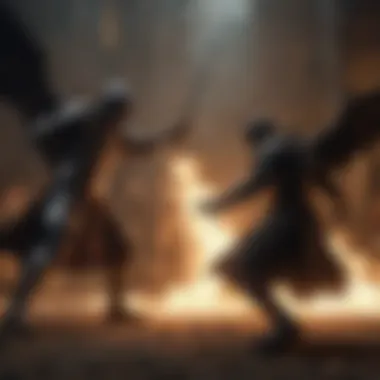
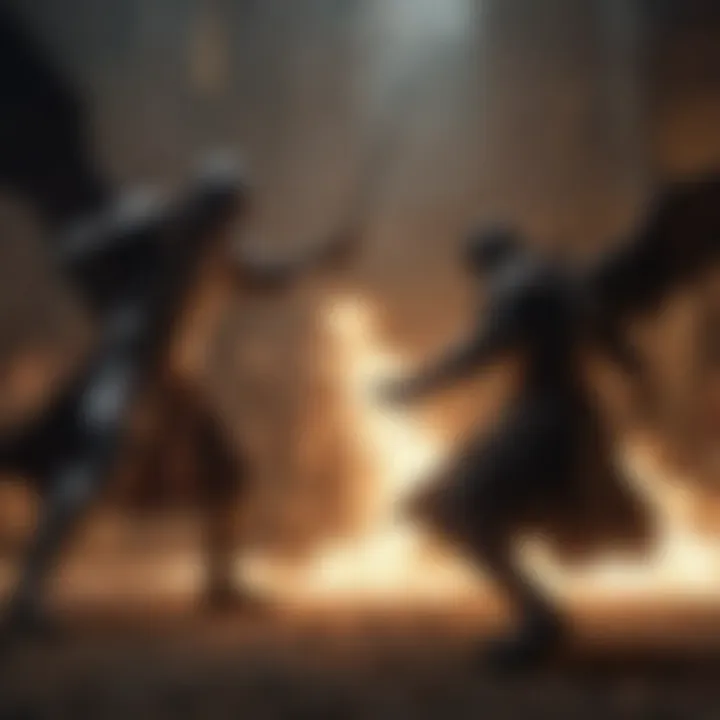
Natural magic emphasizes balance. The use of it demands a deep understanding of its forces. For instance, when Bran Stark undergoes his transformation, it’s not just about gaining powers; it’s about becoming one with nature itself. His journey illustrates that mastery of natural magic requires patience, wisdom, and respect for the laws governing the natural order.
Blood Magic
On the flipside, blood magic is a stark contrast—the kind that makes your skin crawl and raises ethical questions about power and sacrifice. Its practitioners often tread a perilous path. Melisandre is the quintessential user in the series, whose use of blood magic unfolds as both a tool and a weapon. Each ritual she performs highlights its morally ambiguous nature; it’s not just about power, but the cost associated with it.
Blood magic often revolves around sacrifice—whether it is an animal or, more horrifically, a human life. This raises key considerations about the lengths to which individuals and factions will go for power. The flames of R’hllor, which Melisandre fervently invokes, suggest a gateway to understanding fate and destiny through blood, but every invocation leaves a mark. Here, we encounter the consequences of wielding such magic, showcasing the duality of power that can both protect and destroy.
Divination and Prophecy
Divination and prophecy in Game of Thrones act as the lighthouse amid chaotic seas. While they provide insight into possible futures, the interpretations can often lead to confusion and, ironically, missteps. The infamous prophecy surrounding Daenerys Targaryen, for example, is wrapped in riddles, showcasing how predictions can guide characters toward a predetermined fate yet simultaneously entrap them in their desires.
The recurring theme of prophecies often unravels throughout the narrative. Characters like Bran and Melisandre possess foresight, but this comes with its own burdens. The way they interpret visions can alter the course of their actions and decisions, sometimes igniting conflict rather than resolving it. As seen through various events in the series, prophecy serves as a double-edged sword, granting insight while imposing a sense of inevitability on the characters involved.
While exploring these different forms of magic, readers are invited to ponder the underlying message: the greater the power, the greater the responsibility. Each type of magic—natural, blood, and prophetic—serves as both a tool and a burden, shaping the destinies of those who wield it. Understanding these types not only enriches our enjoyment of the narrative but also deepens our appreciation for the meticulous world that George R.R. Martin crafted, where magic intertwines seamlessly with the struggles of humanity.
The Role of Magic in Character Arcs
Magic acts as a significant thread weaving through the character developments and transformations within Game of Thrones. It often serves as a double-edged sword, granting extraordinary powers yet bearing dire consequences. From wielding control over the elements to influencing the fates of kingdoms, the magical elements shape not just character choices but also their eventual destinies. The complexity of how characters interact with magic enlightens the broader themes of power, sacrifice, and morality that permeate the series.
Melisandre and Red Magic
Her Philosophical Underpinnings
Melisandre, the enigmatic shadowbinder, embodies a unique perspective on magic that resonates profoundly with her belief in fate and destiny. Her philosophy centers around the idea that the Lord of Light orchestrates the lives of individuals, suggesting that every soul has a predetermined role to play in the grand tapestry of existence. This belief is not just a reflection of her character but also illuminates the broader themes throughout the series.
Key to Melisandre’s philosophy is her unwavering commitment to her faith, which gives her a sense of purpose and justification for her actions. She believes her powers are a channel for divine will, and this drives her to make choices that often lead others to question the morality behind the means she employs. The unique feature of this ideological framework is how it justifies her manipulation and the eventual catastrophic outcomes that follow. While it enriches the narrative, it also opens a Pandora's box of moral ambiguity.
Impact on Stannis Baratheon
The influence Melisandre has on Stannis Baratheon exemplifies the potent force of magic intertwined with leadership. Stannis, already trapped in ambition, is significantly shaped by Melisandre’s prophecies and promises of victory. She convinces him that through her magic, he is the true king destined to reclaim the Iron Throne. The key characteristic of this interaction is the blend of ambition and faith; however, this relationship is a cautionary tale about the blind following of charlatans.
Stannis's eventual downfall can be attributed partly to his reliance on Melisandre's magic. The unique feature here is the peril of intertwining one's fate with another's perception of power. While it lends depth to their character arcs, it also amplifies the tragic elements of Stannis’s story. His choices, aided by Melisandre, tie the weight of magic directly to the chaos that ensues even among the noble houses of Westeros.
Consequences of Her Actions
Examining the consequences of Melisandre's actions reveals the far-reaching impacts of magic on both personal and political levels. Her decisions lead directly to catastrophic events, such as the burning of King Stannis's daughter, Shireen. This harrowing act exemplifies how her belief in the efficacy of magic overshadows her capacity for empathy or moral consideration.
The defining characteristic here is the idea of sacrifice used to attain goals, emphasizing the grim realities of magic in Westeros. Her actions ultimately highlight a poignant irony: in seeking to fulfill prophecies and destinies, she inadvertently cultivates a landscape rife with despair. The unique feature of the consequences she faces lies within a cycle of regret and realization. Her journey outlines powerful lessons about faith and the manipulation of destiny, contrasting sharply with the more tragic human experiences of loss and suffering.
The Faceless Men
Training and Skill
The Faceless Men present another fascinating aspect of magic in character development. These assassins, swathed in mystery, possess unique abilities revolving around the art of transformation and disguise. Their training demands not only the honing of magical skills but also the relinquishing of personal identity to become "no one."
Key to understanding this training is the philosophy of anonymity, which equips them with extraordinary capabilities, allowing them to manipulate perceptions and realities. This training stands out as it unites the mastery of physical and magical realms, all while weaving a rich narrative about identity. While their skills are formidable, the cost of such training is immense, raising ethical questions about the loss of self. Through their experiences, fans encounter a stark reflection on the nature of identity amid an abundance of intrigue and deception.
Their Role in the Politics of Westeros
The Faceless Men dramatically shape the political landscape of Westeros through their unparalleled skills in assassination and espionage. Their involvement illustrates how magic can function as a tool for power, affecting the hierarchy among the noble houses and shifting allegiances. The significance of their role lies in the undeniable effect they have on key events, leading to the tumultuous journey of numerous characters.
The unique feature of this dynamic is the ethical grey area surrounding their involvement. Often viewed as agents of change, they challenge the notions of good and evil through calculated steps that serve their own agenda. This perspective elevates their narrative presence from mere assassins to powerful players in the ongoing political machinations, culminating in a pronounced commentary on the role of magic in high-stakes power plays and moral complexities.
Indeed, the exploration of magic in character arcs serves as a crucial thread, illustrating how mystical forces intertwine with human ambition, moral choice, and identity, revealing the intricate dance of fates in the harsh land of Westeros.
Magic as a Narrative Device
Magic in the Game of Thrones series serves not only as a mystical element but also as a crucial narrative device. It shapes characters, drives plotlines, and weaves thematic strands throughout the story. Using magic as a narrative tool allows for the exploration of characters’ depths, motivations, and moral choices in ways that mere realism may not permit. Through magic, the storytellers can illustrate the impact of power, the frailty of human life, and the intricate web of destiny woven within the narrative.
Foreshadowing and Magic
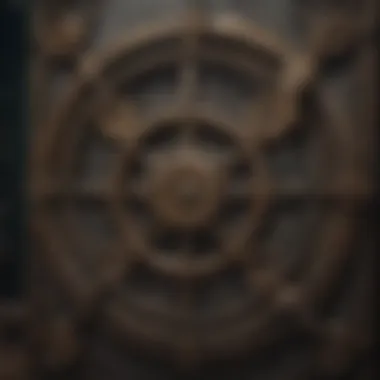

Foreshadowing in Game of Thrones is deftly intertwined with its magical elements. Often, magical events or occurrences serve as precursors to major plot twists or character fates. For instance, the visions experienced by Bran Stark often hint at future events. The direwolf's deaths signal pivotal character decisions or imminent doom, creating a subtle yet powerful connection between magic and foreshadowing.
Wanting to keep viewers just on the edge of their seats, writers subtly drop these hints, nudging audiences to connect the dots. Who doesn’t love a good mystery? This technique sharpens the audience's engagement with the narrative, enhancing the tension and creating a rewarding viewing experience.
Thematic Resonance of Magic
Magic resonates thematically through multiple lenses in the series, particularly in the Exploration of Power and the Cycle of Life and Death.
Exploration of Power
Power dynamics are central to the conflict in Game of Thrones. Magic embodies the struggle for power, transforming characters and subverting traditional hierarchies. Characters like Cersei Lannister and Daenerys Targaryen showcase how magical abilities can entrench one's position or unveil crumbling spaces of power.
Akso, the manipulation of magic reflects the way individuals can seek control over their own destinies. The manipulation of forces, be it through blood magic or the resurrection of the dead, reveals the spectrum of what characters will do to achieve their goals. This aspect of magic is popular because it echoes real-world power struggles, embodying greed, ambition, and moral ambiguity that resonate with audiences.
However, the downside is rather evident. Power, when obtained through magic, comes at a cost, often dismantling individuals and relationships. The pursuit of power can become all-consuming, as seen with characters who tread dark paths.
Cycle of Life and Death
The Cycle of Life and Death is a prevalent theme that reflects upon the interconnectedness of existence in Game of Thrones. Through magical elements like resurrection, the series confronts heavy concepts such as mortality and the subsequent resurrection of beloved, yet morally complex characters.
Magic in this regard invites the audience to question the implications of life and death. It illustrates how characters face their ultimate ledger— are resurrected lives truly lives, or are they mere shadows of who they were? There’s a chilling uniqueness in this thematic exploration, making it a compelling device for both gripping narratives and philosophical introspection.
While this exploration offers deep emotional engagement, it can lead to confusion about character authenticity. Viewers may struggle with the moral implications of bringing characters back from the dead. Does a resurrection erase the stakes? Regardless, the tension between life, death, and rebirth resonates powerfully throughout the narrative.
"Magic not only enchants the realm of Westeros, it mirrors the real struggles of power and existence we grapple with every day."
Through these intertwined themes of power and the cycle of life, magic in Game of Thrones becomes a profound and complex narrative device, not merely for spectacle but for evoking deeper philosophical questions that challenge audience perceptions.
Comparative Analysis of Magic in Literature
The examination of magic within the context of Game of Thrones offers a unique lens through which we can understand its manifestations in various literary works. By comparing the magical constructs of Westeros with those found in other fantasy realms, readers can appreciate the nuances and peculiarities that make Game of Thrones distinct. This section delves into how magic reflects cultural values, shapes character motivations, and serves as a vehicle for plot progression across different narratives.
Magic in Other Fantasy Works
When we take a gander at magical systems in works like The Lord of the Rings by J.R.R. Tolkien or Harry Potter by J.K. Rowling, it becomes clear that the purpose and representation of magic can vary vastly. In Tolkien’s world, magic is often bound to nature and the innate qualities of beings, embedding it in the very fabric of Middle-earth. Wizards like Gandalf are more akin to shepherds of wisdom rather than mere practitioners of spells.
On the flip side, Rowling’s Harry Potter strikes a balance; magic is a tool wielded by its users, often commonplace among wizards and witches. Here, the educational aspect shines, with Hogwarts serving as a sanctuary for magical study.
In contrast, Game of Thrones portrays magic as something enigmatic and fraught with peril. Its manifestations often carry dire consequences, creating a sense of foreboding that challenges characters and readers alike.
- The contrast in how magic operates can reveal cultural attitudes:
- Middle-earth’s connection to nature.
- Hogwarts’ emphasis on learning and mastery.
- Westeros’ magic, which often demands sacrifice.
Contrasting Approaches to Magic
In contrasting the approaches to magic, we can see distinct philosophies shaping each narrative. While magic in Harry Potter is relatively light-hearted and accessible, full of whimsical spells and magical creatures, Game of Thrones takes a grimmer stance. For instance, the use of blood magic not only highlights the darker aspects of power but underscores the sacrifices tied to heightened magical abilities.
Characters in Game of Thrones grapple with their magical gifts, often questioning the morality behind their choices. Think of Melisandre and her reliance on the flames for prophecy yet her consequential role in shaping the fate of kingdoms.
Contrast this with characters like Hermione Granger, who uses her brilliance to master magic, turning it into a tool for good and development, rather than destruction.
"Magic is not a capricious force—but a mirror reflecting the essence of its wielder."
Key Takeaways:
- The Nature of Magic: - Game of Thrones often aligns magic with consequence, while other works may emphasize its utility or whimsy.
- Character Interaction: - In Westeros, magic deepens moral conflicts, unlike the more straightforward applications seen elsewhere
- Cultural Reflections: - Each world’s magic reflects its society’s values, from Tolkien’s ancient connection to nature to Rowling’s educational framework.
Through this comparative lens, fans can deepen their understanding of Game of Thrones and its multi-faceted approach to magic, enriching the narrative’s depth and allure as one navigates the unpredictable landscapes of Westeros.
Fan Interpretations and Theories
Delving into Fan Interpretations and Theories surrounding the magic in Game of Thrones unveils a treasure trove of insights that enrich our understanding of both the narrative and its cinematic portrayal. Fans are not mere consumers of content; they actively engage with the series, developing theories that often illuminate the intricacies of the characters and the world they inhabit. Through various online platforms, discussions can lead to alternative readings of prominent magical elements, resulting in a dynamic conversational culture that defines the audience's relationship with the show.
Fans often seek to decipher symbols, character motivations, and plot outcomes through the lens of magic. It’s like they are putting together a puzzle, where each piece adds depth to the overarching narrative. Such involvement not only fosters a sense of community but also helps to keep the series alive in discussions long after episodes have aired.
Online Discourses and Speculation
Across forums like Reddit and various social media platforms, insights abound regarding magic within Game of Thrones. Online discussions frequently oscillate between theories on plot twists and character developments, revealing how fans decode magic's role. For example, the machinations of the Night King are heavily analyzed with many fans discussing whether his powers symbolize a greater existential threat or are simply a narrative device to elicit fear.
- Theoretical Frameworks: Fans utilize frameworks borrowed from mythology and history to speculate on the origins of magic in Westeros. This can range from Norse mythology references to interpretations of ancient alchemical practices.
- Cultural Context: Another area of discussion is the cultural significance of magic. Online discourses often reflect real-world issues, demonstrating how magic can serve as a metaphor for political power, societal structures, and industrialization, drawing parallels to our immediate experiences.
Significant theories that surface repeatedly include ideas centered around the connection between magic and the cyclical nature of power, echoing themes found in classical literature. The magnification of magic during critical plot moments also stirs exciting debates about its narrative utility.
Impacts of Fan Theorizing
Fan theorizing substantially impacts how magic in Game of Thrones is perceived and interpreted. It builds an extensive tapestry of engagement that stretches beyond the series itself. The myriad of ideas circulating among fans often influences how subsequent content is perceived, even affecting reception of new materials related to the franchise.
Some impacts include:
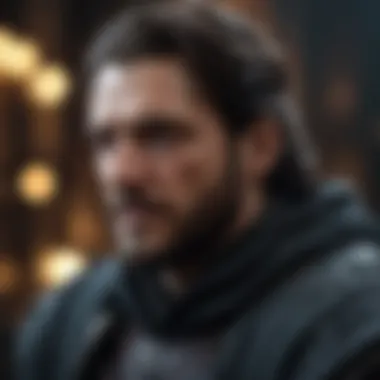
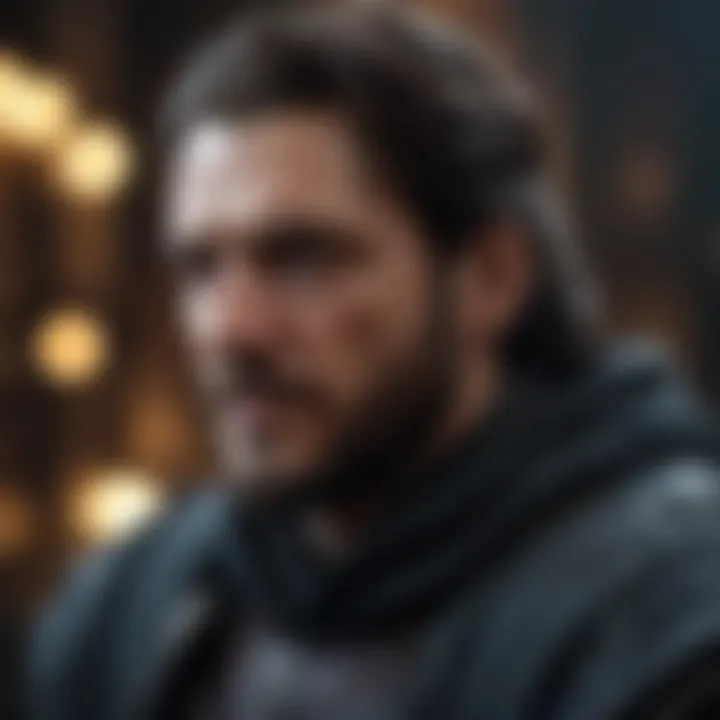
- Filling Gaps: Fans often create theories to fill the gaps in the narrative. Characters like Bran Stark and his abilities are often scrutinized, leading to various interpretations of his role in the story and the underlying mechanics of magic.
- Cohesion among Fans: The shared nature of fan speculations strengthens bonds within the community. By collaborating and discussing divergent views, individuals foster a collective understanding, often leading to contructive discussions that can escalate into lively debates.
- Contemporary Relevance: The theories aim to resonate with today’s world, reflecting on themes such as power struggles and ethical dilemmas, which makes the series feel more relevant than ever.
"Fan interpretations breathe new life into the world of Westeros, showcasing how Game of Thrones transcends mere entertainment, transforming into a living, breathing conversation about the complexities of humanity and power."
The Evolution of Magic from Book to Screen
The transformation of magic from the pages of George R. R. Martin’s novels to the dynamic screens of HBO’s Game of Thrones represents a fascinating journey of adaptation. Understanding this evolution is not merely about recognizing what changed; it involves appreciating the nuanced implications of these changes on the narrative, characters, and overall atmosphere of a series that captivated millions worldwide. It showcases the balance between literary depth and visual storytelling, drawing a line from the rich complexities of written magic to more digestible cinematic representations. Each twist and turn reveals how magic can be tailored to enhance, simplify, or reinterpret the original material for a broader audience.
Changes in Depiction
The depiction of magic has undergone significant alterations when transitioning from printed word to screen. In the books, magic often hovers delicately on the fringes, more akin to an understated whisper in a grand tale, its workings shrouded in mystery. For instance, the workings of fire magic as practiced by Melisandre are described with a philosophical layer, inviting readers to ponder its implications. In contrast, the television adaptation brings these magical elements forward, presenting them with a bombastic flair.
- More visual spectacle: The climactic moments of magic—such as dragons soaring through the sky or fire erupting in battle—are given grand visual treatments. These scenes leave little to the imagination and instead drive the excitement through stunning graphics and sound.
- Condensed narratives: Certain magical elements are condensed or simplified to fit a tighter narrative arc. The complex rituals of Blood Magic are presented more straightforward, often sacrificing some of the lore depth found in the books for expediency in storytelling.
The adaptation process inevitably alters the tone; the subtle magic that plays off-page often morphs into grand spectacles, shifting focus away from the philosophical underpinnings of magic to thrilling pyrotechnics.
Cinematic Techniques Used to Portray Magic
Cinematically, the portrayal of magic employs various techniques to ensure that it resonates with the viewers and enhances the storytelling. The following elements stand out:
- Visual Effects: The use of CGI defines the visual representation of magic. Creators developed breathtaking effects to depict dragons, fireballs, and magical duels. A notable example is the wildfire explosion, showcasing how technology can transform a script’s magical description into a visceral experiences.
- Sound Design: Magic’s auditory elements play a critical role. The hissing of fire, the hum of spells, or the sudden silence before an incantation draw viewers deeper into the scene. This audio landscape provides not just atmosphere but also hints at the power dynamics at play.
- Character Focus: Certain characters take on heightened magical significance due to their unique portrayals. For instance, Bran Stark's warging abilities in the show are presented with a distinct visual narrative, weaving his story tightly with the mystical elements of the series.
- Lighting and Color Grading: The mood is often enhanced through specific lighting choices, with colder tones used to depict the cold magic of the White Walkers, contrasting with the warm hues surrounding fire magic.
The marriage of these cinematic techniques creates a richer, more immediate experience that transforms the inherent essence of the magic found in the text into a breathtaking visual tapestry. Ultimately, through these adaptations, the series not only showcases its magical elements but also invites viewers into a world where the boundaries of reality blur with that of the fantastic.
Cultural Significance of Magic in the Series
Magic in Game of Thrones is not just an embellishment; it weaves into the very fabric of the story, infusing it with profound cultural significance. This complex portrayal serves to highlight various societal themes, religious beliefs, and underlying power dynamics. The presence of magic delves into the realms of spirituality and social stratification, reflecting the characters' struggles and ambitions while shifting the narrative in compelling ways. An exploration of magic’s cultural implications can enhance our understanding of character motivations and overall story arcs, enriching the viewer’s journey through Westeros.
Magic and Religion in Westeros
In Game of Thrones, magic often intertwines with religion, revealing a unique dynamic that influences the beliefs and actions of many characters. Take Melisandre, the Red Woman, who practices a fiery form of magic connected to the worship of R'hllor, the Lord of Light. Her belief system shapes not just her actions but also those of the people around her, most notably Stannis Baratheon, who places immense faith in her prophecies. This relationship between magic and faith demonstrates how powerful spiritual convictions can drive otherwise rational individuals to make perilous decisions.
Moreover, the Faith of the Seven represents another facet of religious magic, where believers perform rituals and seek guidance from their deities. Here, magic manifests in the form of holy relics, prayer, and even visions experienced by certain characters. This intersection raises questions about the authenticity and morality of the wielders—are they truly conduits of divine will, or merely charlatans exploiting faith for personal gain?
"Magic in Game of Thrones is a reflection of the intricate dance between power, belief, and the human experience."
The constant tug-of-war between different belief systems illustrates how deeply magic permeates the culture of Westeros, not merely as a tool of the occult but as a critical component of identity shaping.
Social Hierarchies and Magical Practices
The diverse uses of magic in Game of Thrones distinctly mirror the social hierarchies present in the realm. Certain forms of magic are exclusive to specific groups, revealing class distinctions and privilege. For instance, the Faceless Men, elite assassins trained in the art of disguise and transformation, operate from the shadows and maintain a powerful, albeit secretive, presence in society. Their abilities are closely tied to the worship of the Many-Faced God, emphasizing the notion that magical proficiency is often reserved for those at the apex of power or with the right connections.
In stark contrast, common folk often view magic with fear or suspicion, illustrating a societal divide. Their experiences with magic are largely negative, as seen in the persecution of those labeled as witches or sorcerers. This illustrates a broader commentary on how societies can demonize the unknown, and how fear can serve to maintain the status quo within entrenched power structures. The consequences faced by characters like Daenerys Targaryen further amplify this theme: her magical dragons symbolize both her powerful lineage and the precarious position of a woman challenging the traditional male-dominated order.
Ultimately, the cultural significance of magic in Game of Thrones reveals how deeply it influences interpersonal dynamics, societal roles, and the overarching narrative. By examining these elements, one gains a richer understanding of Westeros's complex world, where magic isn’t just a fantastical element but a catalyst for conflict, empowerment, and survival.
The Ends and Future Considerations
The intricate tapestry of magic within Game of Thrones serves as more than just thrilling spectacles or fantastical elements. It influences plot direction, builds character depth, and invokes reflections on morality, power, and the consequences of one's actions. As we wrap up our examination, let's underscore significant takeaways and contemplate what the future might hold for fantasy narratives, inspired by this ambitious series.
Impact on Future Fantasy Narratives
It's clear that the innovation displayed in Game of Thrones has carved its mark on the fantasy genre. The subtleties of its magic — often entwined with the fabric of political intrigue and human emotion — have set a precedent. Prospective storytellers might glean lessons about incorporating magic to enrich character development rather than merely serving bare-bones plot functions.
- Complexity over Simplicity: The magic in Game of Thrones is not just about spells and incantations; it’s tied closely to the characters' aims, fears, and desires. Future authors might find inspiration in creating magic systems that reflect the characters’ internal struggles.
- The Moral Compass: Magic often straddles the thin line between good and evil within the series. For writers looking toward the future, embedding a moral ambiguity in magical practices can drive deeper narrative tension.
- Intertwined with Reality: The blending of magic and reality is a lesson for new works in this genre. Magic that coexists with real-world issues, like social hierarchies or ethical dilemmas, opens the door to rich storytelling potential.
Ultimately, as emerging narratives evolve, they might echo the complexity and nuance found in the world of Westeros. The use of magic as both a narrative engine and a character development tool can revitalize game-changing stories.
Enduring Legacy of Magic in Game of Thrones
Game of Thrones has not only transformed popular perceptions of fantasy but has also left an indelible legacy on how magic can be portrayed across various forms of media. Even as the show concludes, its magical dimensions continue to inspire countless discussions, fan theories, and creative works.
- Cultural Impact: Aspects of its magic have found their way into other media, from literature to video games, often imitating its philosophical underpinnings and moral complexities. For instance, series like The Witcher and Shadow and Bone share thematic echoes with the magic paradigms set forth by HBO’s adaptation.
- Fan Communities: The discussions and debates that sprout from fan interpretations of magical facets bolster a community that diligently examines every nuance of the series. Platforms like reddit.com have abundant threads devoted to dissecting the implications of magical events, proving that the roots of Game of Thrones run deep.
- Legacy in Storytelling: As older forms of media blend with emerging platforms, some creators will undoubtedly draw on the thematic strengths of Game of Thrones, echoing its exploration of power, consequence, and moral ambiguity intertwined with magic.
"The true nature of magic in Game of Thrones is a reflection of humanity itself, complex and often paradoxical."
As we consider what lies ahead, it’s safe to say that the magic realm of Game of Thrones will continue to resonate, inspiring fresh interpretations and alternative narratives in the expansive landscape of fantasy storytelling.



